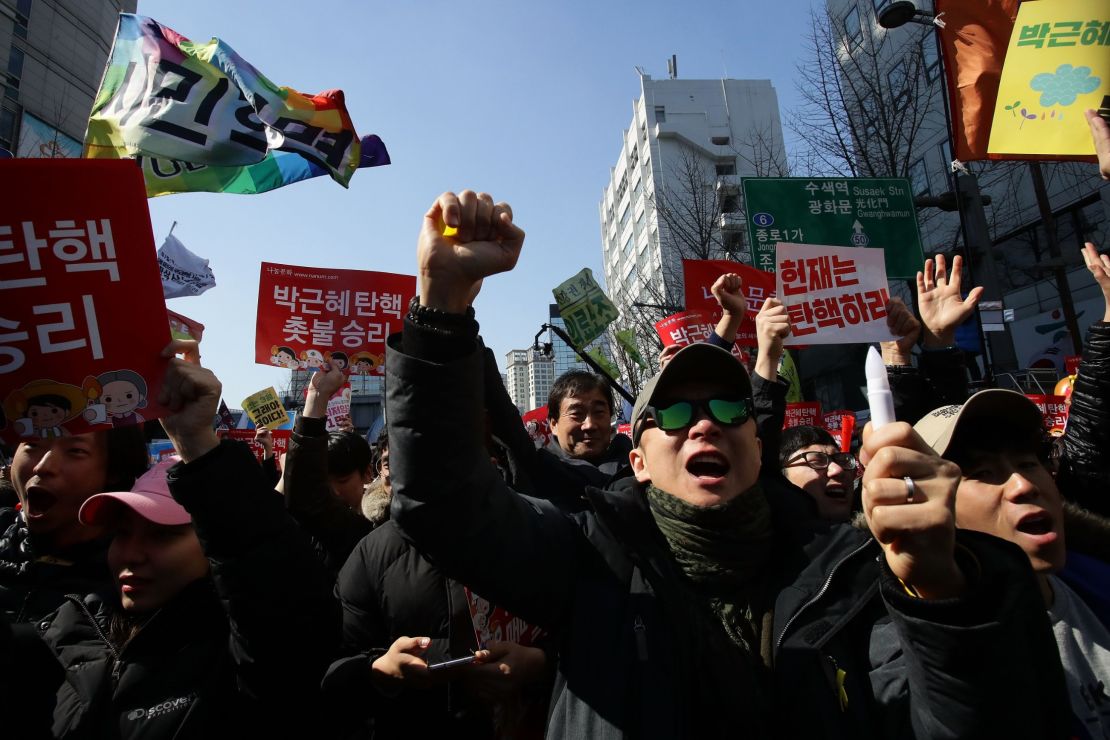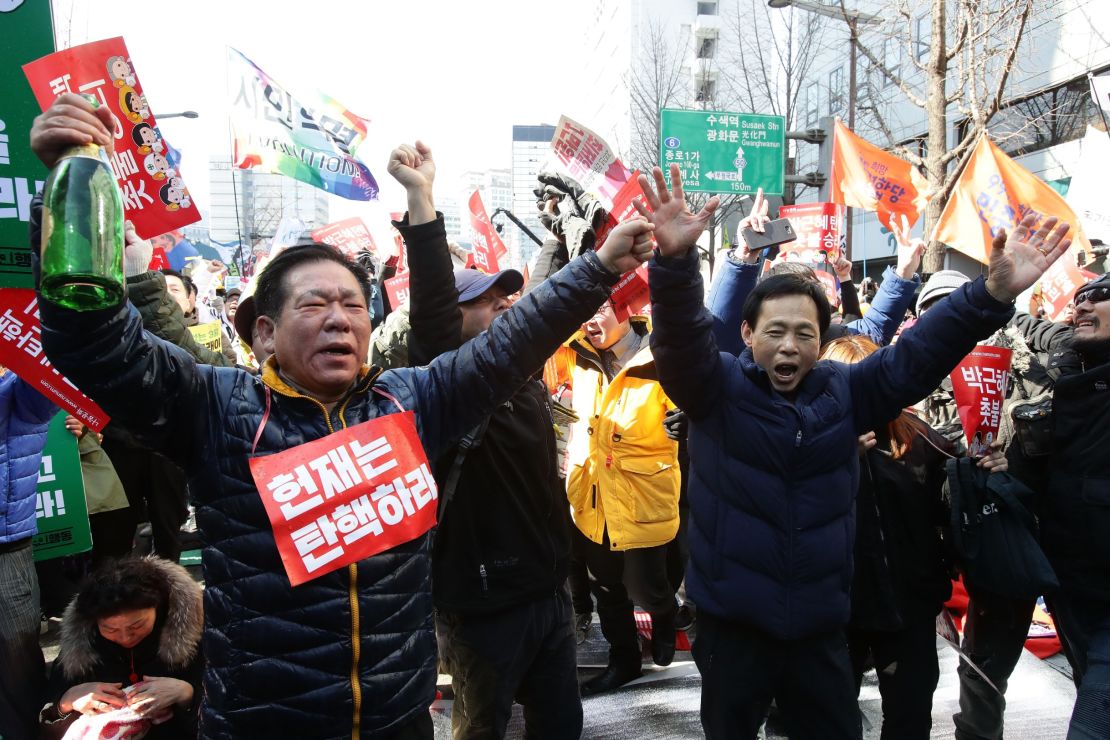Editor’s Note: An earlier version of this story misspelled President Park’s given name. This has since been corrected.
Story highlights
Court votes 8-0 to uphold impeachment; election to be held within 60 days
Park impeached by lawmakers last year following scandal involving her unofficial adviser
South Korea’s Constitutional Court has upheld a decision by the country’s National Assembly to impeach President Park Geun-hye over alleged corruption.
The unprecedented decision was unanimous, with all eight judges on the court voting to remove Park, the country’s first female president, from office. South Koreans immediately took to the streets, with some groups protesting against the decision and others celebrating her removal from power.
Two people died in the protests, a statement from Prime Minister and acting President Hwang Kyo-ahn said.
The decision was revealed by Justice Lee Jung-mi Friday in a live broadcast that gripped the nation.
“We announce the decision as the unanimous opinion of all judges. We dismiss the defendant President Park,” said Lee.
South Korea’s political stability is crucial to the security of the region – it is a key buttress against North Korea, its provocative neighbor, and a major trading partner with the US and its Asian neighbors.
Here are the main developments from the day:
- South Korea’s first female president becomes the first to be ousted as a result of impeachment.
- Now stripped of her immunity, Park is liable to prosecution for the scandal that brought about her ouster.
- Pro- and anti-Park protests throng the streets of the capital.
- Park supporters have been cordoned off by police; they’re trying to reach the court which handed down the decision.
- Injuries have been reported as emotions run high in the protests.
- North Korea says Park will be investigated “as a common criminal.”
Park is the first South Korean president to be thrown out of office by the court. An election for her replacement must be held within 60 days, with Hwang, the acting President, to set the day.
Park’s ouster means she loses the protection from prosecution she enjoyed as president. She could now face a formal investigation into her role in the corruption scandal which led to her impeachment.

Downfall of South Korea’s political princess
Protests
During the announcement, anti-Park demonstrators were seen crying tears of joy and pumping fists in celebration, as applause rang out from the crowd.
Thousands of Park’s supporters waved South Korean flags as they stood on main thoroughfares near the Constitutional Court.
They were hemmed in by a ring of police officers, many wearing protective armor, and police vehicles.
A group of around 100 Park supporters tried to break through police lines near the court, and a number of people fell and were injured. Medical attention was provided at the scene.
Protests amid South Korean President's removal from office
Park’s supporters tried to reach the court, rocking the buses which blocked their way and attempting to climb over them.
Emotions were running extremely high in the pro-Park camp. One woman was heard by CNN screaming “democracy is dead, South Korea is dead.”
Ramped-up security
Hwang, who will remain in power until the election, has instructed all military personnel to be on alert and to increase security, the official said.
Police had issued the highest level of emergency order possible in Seoul ahead of the announcement.

About 21,000 officers are on standby for expected protests, with 270 units being mobilized.
The US, a key ally, responded to the decision by offering assurances that the two countries’ relationship would continue uninterrupted.
“We will continue to work with Prime Minister Hwang for the remainder of his tenure as acting President, and we look forward to a productive relationship with whomever the people of South Korea elect to be their next president,” acting State Department spokesman Mark Toner said.
”The United States continues to be a steadfast ally, friend, and partner to the ROK,” he said, using the acronym for South Korea’s official name, the Republic of Korea.
“The US-ROK alliance will continue to be a linchpin of regional stability and security, and we will continue to meet all our alliance commitments, especially with respect to defending against the threat from North Korea.”
North Korea’s official news agency noted that her immunity had been stripped, reporting that she “will be receiving (a) full-scale investigation” as a “common criminal.”
Political chaos
Park’s problems began in October, when revelations emerged about the influence her confidante and adviser Choi Soon-sil had over the President.
In December, lawmakers voted to impeach Park by a vote of 234 to 56, stripping away her executive powers. Since then she has remained in the presidential Blue House, but has remained largely out of public view.
The court upheld the impeachment because she was judged to have abused her authority in helping Choi raise donations from companies.
Full coverage
Local media and opposition parties have accused Choi of abusing her relationship with the president to force companies to donate millions of dollars to foundations she runs.
In a televised apology, Park said Choi looked at “some documents” for a certain period of time after Park took office, but didn’t specify what they were.
“I am shocked and my heart is breaking for causing public concern,” Park said.
Though she never held an official position, revelations showed that Choi was also given advance access to presidential speeches and other documents.
Choi is currently on trial for abuse of power and fraud. She denies all charges against her.
Park’s final weeks in office were marred by huge demonstrations ashundreds of thousands of South Koreans braved the brutally cold winter temperatures to take to the streets of Seoul and call for her ouster.
Park is not the first South Korea president to have faced impeachment. In 2004, late President Roh Moo-hyun was forced out of office for two months. However, the Constitutional Court later restored Roh to power, rejecting charges of abuse of power and mismanagement.
South Korea presidential scandal: What you need to know
CNN’s Pamela Boykoff and journalist Taehoon Lee contributed reporting from Seoul.






































